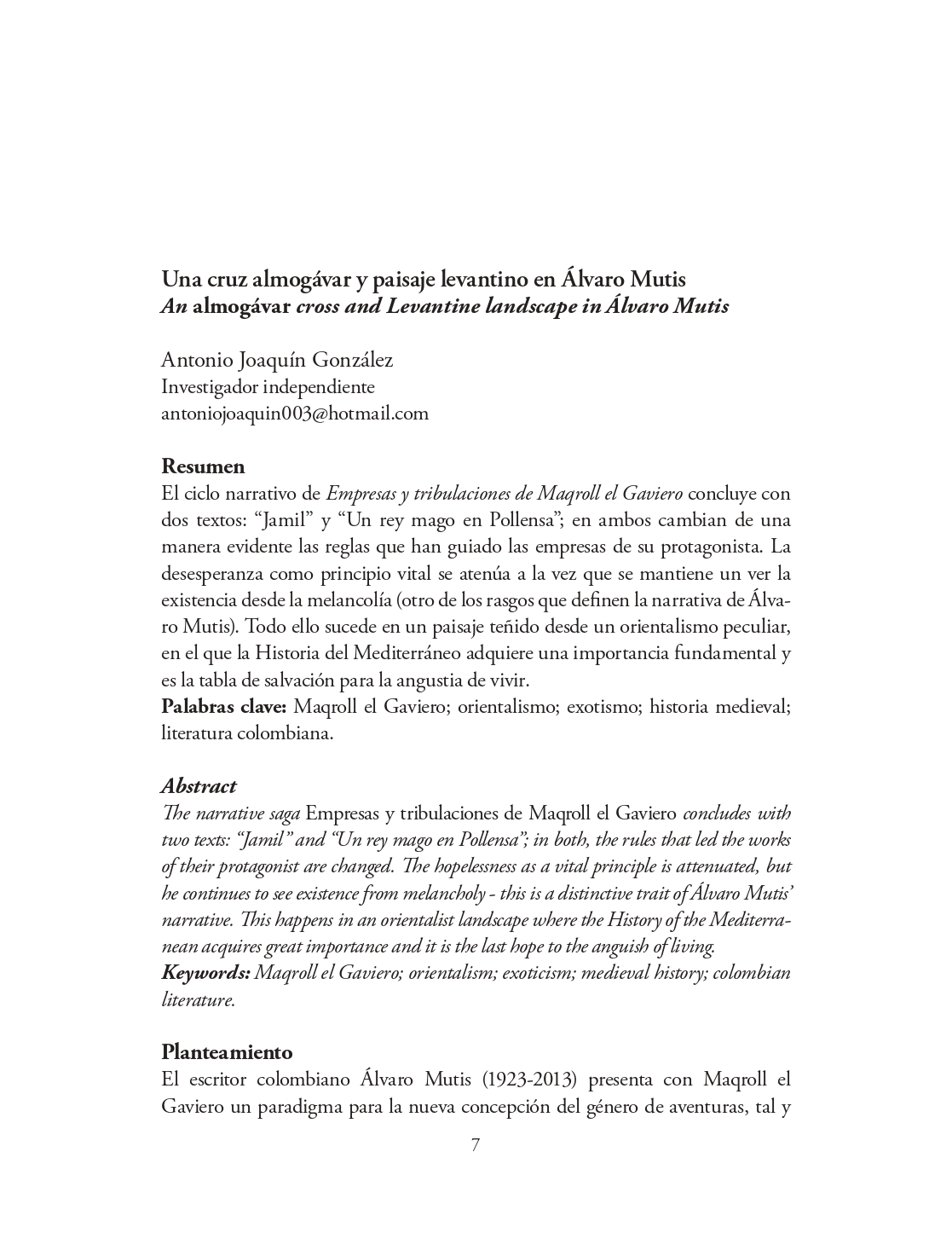
Keywords
Maqroll el Gaviero
orientalism
exoticism
medieval history
colombian literature
orientalism
exoticism
medieval history
colombian literature
Abstract
The narrative saga Empresas y tribulaciones de Maqroll el Gaviero concludes with two texts: “Jamil” and “Un rey mago en Pollensa”; in both, the rules that led the works of their protagonist are changed. The hopelessness as a vital principle is attenuated, but he continues to see existence from melancholy - this is a distinctive trait of Álvaro Mutis’ narrative. This happens in an orientalist landscape where the History of the Mediterranean acquires great importance and it is the last hope to the anguish of living

This work is licensed under a Creative Commons Attribution 4.0 International License.
Copyright (c) 2019 Diseminaciones
Similar Articles
- Alejandro Fielbaum S., The interstices of liberalism. Theater and Peronism in Borges , Diseminaciones: Vol. 1 No. 1 (2018)
- Rodrigo Antonio Vega y Ortega Baez, Irma Escamilla Herrera, Instructive readings of European and American geography for women through La Familia (Mexico City, 1883-1892). , Diseminaciones: Vol. 6 No. 11 (2023)
- Daniela Renjel Encinas, An eschatology of the narcotelenovela: visions and versions , Diseminaciones: Vol. 8 No. 16 (2025)
- Juan Manuel Tabío, Ansí fabló Omero. Some remarks on the reception of the Ilias Latina in Spanish Medieval Literature , Diseminaciones: Vol. 6 No. 12 (2023)
- Jorge Iván Jaramillo Hincapié, Afro literary walks. Intercultural poetics as forms and ways of inhabit(ing) and be(ing) in the world , Diseminaciones: Vol. 6 No. 12 (2023)
- Natalia Duque-Cardona, Sebastián Alejandro Marín-Agudelo, Internationalization and interculturality of the curriculum at the Inter-American School of Librarianship (UdeA) , Diseminaciones: Vol. 7 No. 13 (2024)
- Felipe A. Ríos Baeza, La larga risa de todos estos años: Efectos del núcleo metapoético en la antipoesía de Nicanor Parra , Diseminaciones: Vol. 2 No. 4 (2019)
- Alexánder Sánchez Mora, The celebration of holiness in the kingdon of Guatemala: the mercedarian poetic fair in honor of San Pedro Pascual de Valencia (1673) , Diseminaciones: Vol. 4 No. 7 (2021)
- María Tausiet, Brigid’s torments. The spiritual itinerary of a demoniac (1599-1601) , Diseminaciones: Vol. 3 No. 6 (2020)
- Íñigo Ongay de Felipe, Cartographies of de World, of God and of the Soul , Diseminaciones: Vol. 1 No. 2 (2018)
You may also start an advanced similarity search for this article.
Most read articles by the same author(s)
- Araceli Mendieta Ramírez, Saúl Alejandro García, Critical interculturality in the training of educators to make cultural stratifications visible , Diseminaciones: Vol. 6 No. 12 (2023)
- Juan Manuel Arriaga Benítez, Meaning construction in film , Diseminaciones: Vol. 2 No. 4 (2019)
- Roberto García Bonilla, Biography, history and writing on Amparo Dávila , Diseminaciones: Vol. 5 No. 9 (2022)
- Heriberto Antonio García, La genealogía como investigación histórica en Foucault , Diseminaciones: Vol. 1 No. 1 (2018)
- Edgar Martínez García, Zuzana Erdösová, Female Gender entering into the Mexican Albur: Transformations, Innovations, Strategies , Diseminaciones: Vol. 3 No. 5 (2020)
- Ángel Chávez Mancilla, ‘El burgués gentil hombre’. Un retrato de la lucha de clases en el siglo XVII , Diseminaciones: Vol. 1 No. 2 (2018)
- Brenda Morales Muñoz, Reflections on migration from Tell Me How It Ends: An Essay in Forty Questions, by Valeria Luiselli , Diseminaciones: Vol. 2 No. 3 (2019)
- Blanca Alejandra Velasco Pegueros, Being cochimí: ethnic identity of a people considered extinct , Diseminaciones: Vol. 6 No. 12 (2023)
- Liosdany Figuera Marante, The cuban culture in the seventies , Diseminaciones: Vol. 4 No. 8 (2021)
- Araceli Alemán, Cognitive poetics: a field at the intersection , Diseminaciones: Vol. 2 No. 4 (2019)
